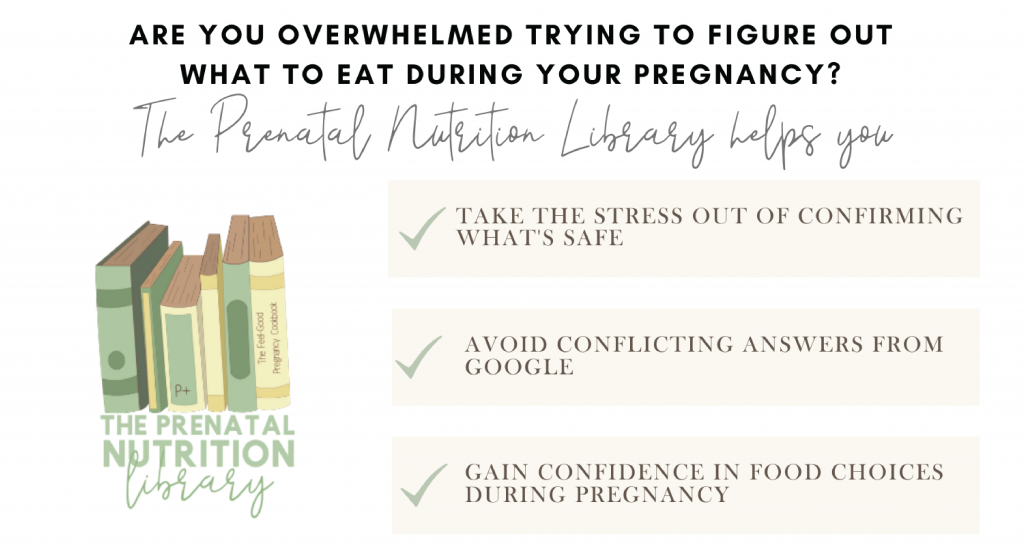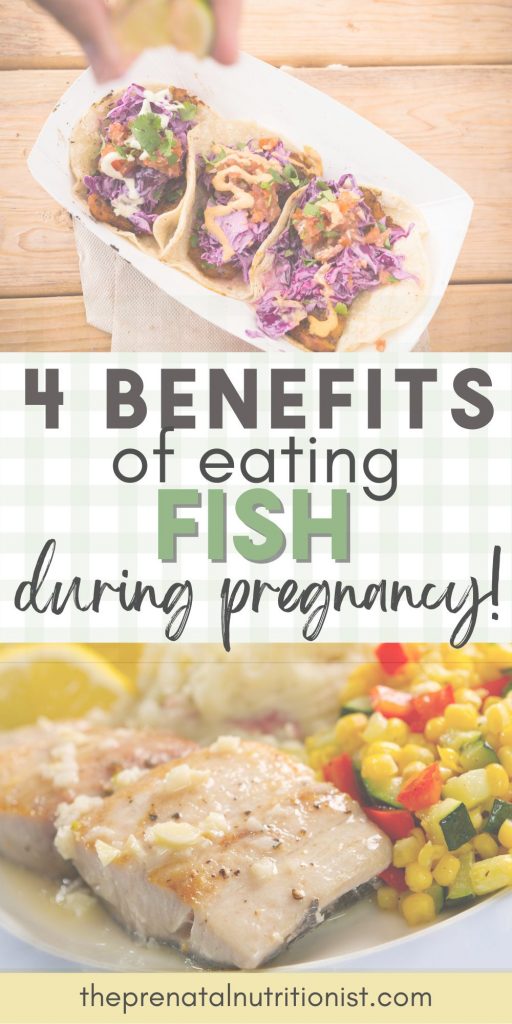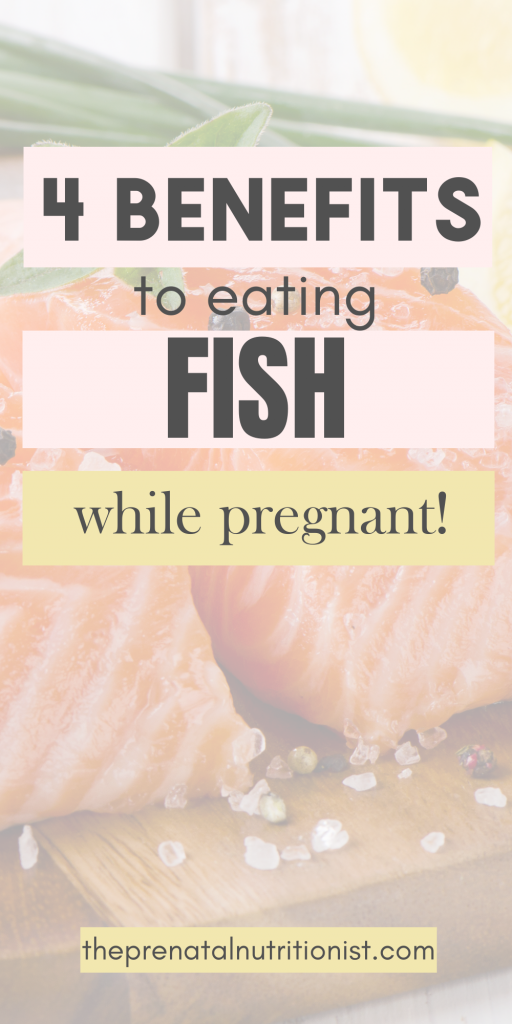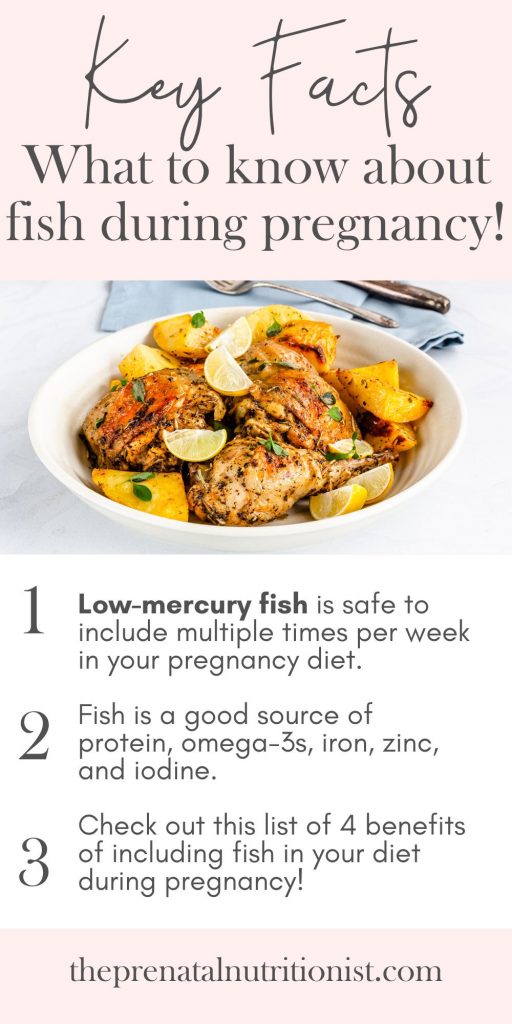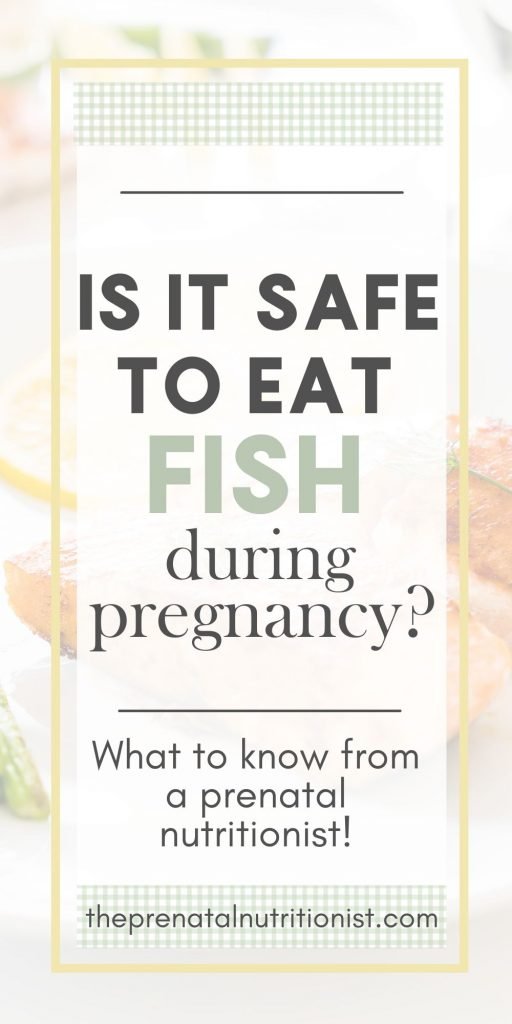
Whether you’re happily child-free, hoping to grow your family, or currently have a bun in the oven, eating fish is one of the best ways to promote overall health and the nutritional benefits of fish are many. Most fish are high in protein and other essential nutrients like vitamin D and selenium. Oily types of fish, like salmon, are also a good source of heart-healthy omega-3 fats. Win-win-win!
The Food and Drug Administration (FDA) and the Dietary Guidelines for Americans recommend that everyone eat at least 8 ounces of seafood each and every week. The guidelines recommend that pregnant women consume between 8 and 12 ounces (340 grams) of low-mercury seafood weekly. For expecting mothers, this equates to 2-3 servings of fish per week.
There are several superfoods (if superfoods we a thing!) people should include in their diet throughout their entire pregnancy, and fish is one. Eating fish not only provides a plethora of health benefits for expecting mothers, but the nutrients found in fish directly support the growing baby as well.
Before we dive into the benefits of eating fish during pregnancy and which fish are best to consume, let’s first go over some quick tips for eating fish during pregnancy and some of my advice about eating fish from a prenatal dietitian:
- Avoid fish with high levels of mercury
- Undercooked and raw fish is recommended to avoid during pregnancy
- Take note of local fish advisories
- Purchase fish from reputable sources
- Cook fish to an internal temperature of at least 145° F
- Enjoy 8-12 ounces per week or 2-3 servings of fish a week
4 Benefits Of Eating Fish During Pregnancy
Directly supports baby’s brain development.
High-quality fish are one of the best sources of omega-3 fatty acids, also known as EPA and DHA (docosahexaenoic acid, DHA). Omega-3 fatty acids have many benefits during pregnancy, including that they directly support baby’s brain development. They are a primary structural component of the human brain, eyes, and skin. Plus, they play a big role in the growth and development of the baby’s nervous system and immune system. On top of all that, they have been researched to help reduce the risk of preterm labor.
Provides essential nutrients for baby’s overall growth and development.
Fish contain a plentiful supply of vitamins, minerals, and other nutrients for a healthy pregnancy. Let’s take a look at the most common nutrients found in fish and how they support the overall growth and development of baby.
Iron: During pregnancy, blood volume rises to support oxygen transfer to the baby. To support the creation of these new red blood cells and thus ensure the baby is getting plenty of oxygen, pregnant women need to consume plenty of iron.
Zinc: Zinc is essential during pregnancy for two main reasons. First, zinc is an integral part of protein synthesis. Since amino acids provide building blocks for a baby’s brain and body, zinc is required for healthy development. Second, zinc directly supports the immune system. The immune system is slightly suppressed during pregnancy, making pregnant people more susceptible to illness.
Protein: Protein serves many purposes in the body, especially during pregnancy. Protein is involved in every process in your and your developing baby’s body, from regulating pH to balancing fluids, transporting nutrients, and DNA creation. As well as organ, bone, blood vessel, connective tissue, and joint formation.
Iodine: Iodine supports thyroid health, which supports the healthy secretion of thyroid hormones. These hormones are especially important during pregnancy because they help regulate metabolism, heart health, and fetal development—more iodine-rich foods, here.
Vitamin D: Vitamin D is essential during pregnancy. Perhaps most well-known, vitamin D is vital for bone health. Lack of vitamin D is also linked to adverse pregnancy outcomes such as gestational diabetes, preeclampsia, gallbladder issues, and miscarriage in the first trimester – making it even more essential to consume plenty of this vitamin.
Supports mother’s heart health.
In addition to the other benefits we mentioned earlier, omega-3 fatty acids are beneficial for the overall health of expecting mothers too. Omega-3s have been linked to heart health benefits as well as cognitive health. And the healthier mother is, the more likely she is to experience a happy and healthy pregnancy.
May reduce and prevent symptoms of depression.
Mood swings, tiredness, fatigue, trouble sleeping, and symptoms of depression have been associated with pregnancy. Postpartum depression is common. There’s no shame in experiencing any of these symptoms or a surefire way to prevent postpartum depression. With that said, eating fish may help prevent some of these symptoms and reduce the risk of postpartum depression by providing expecting mothers with the nutrients (especially omega-3s) they need to ward off them.
Best Fish For Pregnancy
With all that being said, not all fish are created equal. Larger fish, such as sharks, swordfish, king mackerel, and tilefish, tend to have higher levels of mercury and are thus not recommended during pregnancy. Instead, pregnant women should opt for low-mercury, high-quality fish sourced from reputable distributors. See below for a roundup of examples of the best and safest fish for pregnant women!
Salmon
With a rich taste, low mercury, and tons of nutrients, salmon is a super beneficial fish to consume during pregnancy. This fish is a fantastic source of DHA and EPA, as well as vitamins B6 and B12, selenium, and iodine. Plus, salmon is one of the most versatile fish in our roundup today. You can throw some salmon on your next salad, try a delicious lemon-butter salmon filet, or whip up some fluffy salmon cakes. So many nutrients and so many options.
Anchovies
Anchovies are small saltwater fish, commonly canned in oil. Most enjoy anchovies in pasta and salads or as a snack out of the can. These little fish pack a nice protein punch with a whopping 13 grams of protein per 2-ounce can. They also contain plenty of omega-3 fatty acids and small amounts of iron, potassium, magnesium, calcium, cobalamin (vitamin B12), and vitamin B6. Plus, they contain very low levels of mercury.
Sardines
Like anchovies, sardines are also small fish usually packaged in a can. In most cases, you’ll find them soaking in water, oil, tomato sauce, or mustard sauce – all of which are tasty and completely safe to consume during pregnancy. Sardines are an excellent source of protein (~22 grams per serving), calcium, iodine, selenium, and vitamin B12. Looking for a way to incorporate sardines into your diet? Add them to your next pizza, salad, or pasta, or spread them on toast.
Cod
Craving some fish and chips? Dig in! Pacific and Atlantic cod are both safe fish to consume during pregnancy. While cod contains fewer omega-3 fatty acids than some other fish on this list today, it’s still a great source of essential nutrients like B vitamins, phosphorus, selenium, and protein. In need of a good cod recipe? We’ve got you covered! Try this delicious baked cod and yogurt mashed potatoes!
Tilapia
Tilapia is a freshwater fish known for its mild flavor and relatively inexpensive price, both of which make it one of the most popular fish in the United States. You will find two primary varieties of this fish: farm-raised and wild-caught. While both are safe to consume during pregnancy, pregnant women should choose wild-caught when possible and it’s available. Nutrients in this fish include omega-3 fatty acids, calcium, protein, magnesium, phosphorus, and more. See some tilapia recipes here.
Add low-mercury, high-quality fish to your pregnancy diet today!
Here at The Prenatal Nutritionist, we hope we’ve inspired you to up your fish intake throughout your pregnancy to multiple times a week. As you cook fish, be sure to keep all food safety guidelines in mind, and always feel free to reference this article for great low-mercury fish options to cook, cooking tips, and recipe ideas. For more on fish consumption, including which fish/seafood are safe to consume during pregnancy, click here.
If you cannot eat fish during pregnancy, or there is a risk of eating fish during pregnancy, you can find many nutrients fish provides in other foods; however, some are more challenging, like vitamin D and DHA! Sign up for The Prenatal Nutrition Library for more guidance on these nutrients, why they are so important, and where to find them. The Prenatal Nutrition Library is a searchable database, so you will have peace of mind that what you eat during pregnancy is safe and nutritious. We also have a guide on fish-free diets if your fish intake during pregnancy is zero too!
